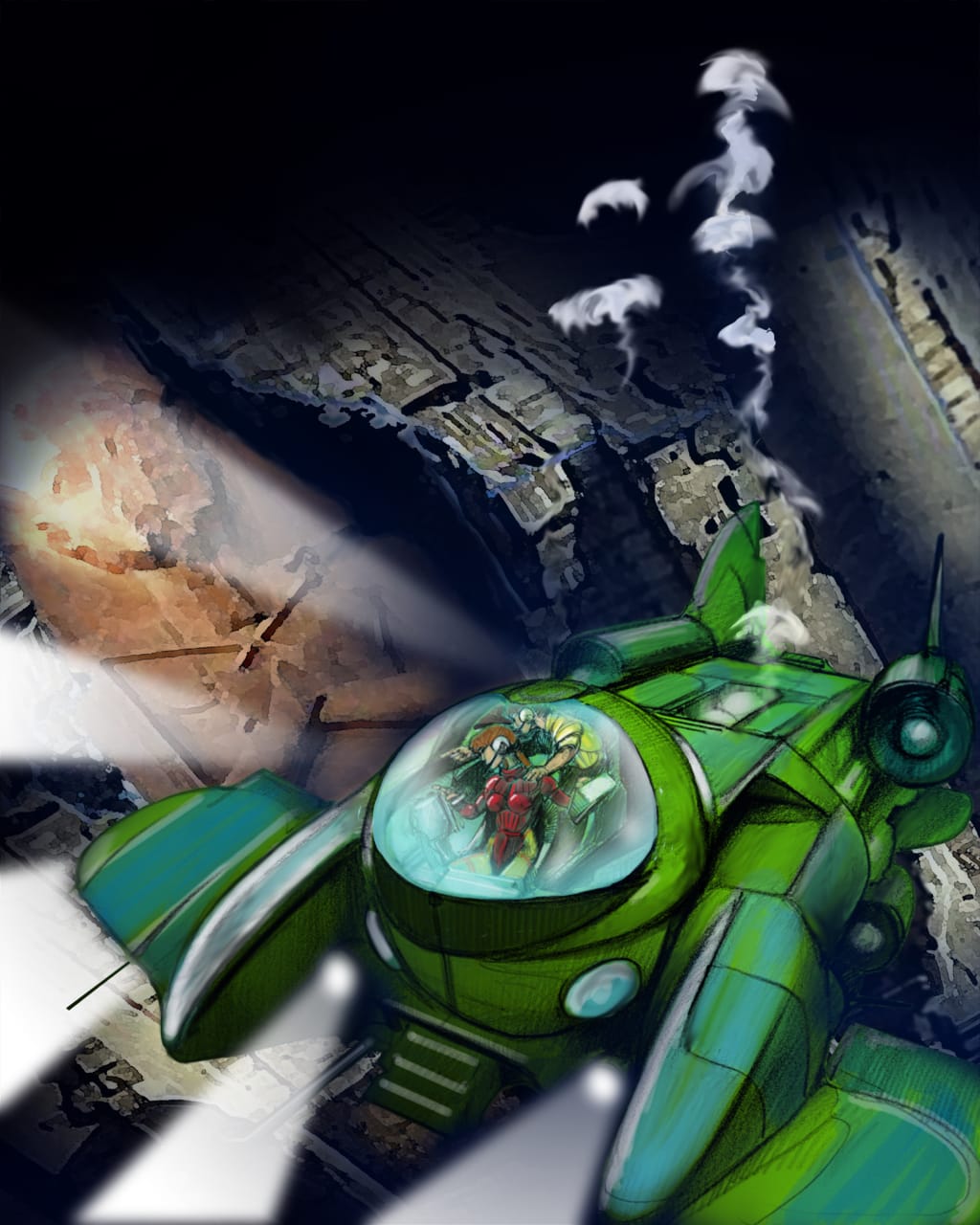
There was a time when Russia's coastal Mirnyy Station supplied the Vostok camp by tractor-pulled sledges once a year. Those were the impoverished years when Russia struggled to maintain Vostok on its own. Global climate change, and the ever more critical need to understand it, altered all that. The long buried lake was thought to hold possible clues to long-term change. If its maybe million year pristine record could be studied, it might reveal that the changes that now threatened the earth were nothing more than vast cyclical events which mankind would eventually survive. Then again, the lake might prove that survival was no longer a sure thing.
Now, long range Eurocopters capable of carrying a ton of cargo and nine passengers could make the 870 mile journey from Mirnyy in a few hours. The sledges took a month. On occasion, the Americans would bring in a C-130A from McMurdo. The plane would be loaded with internationals, cargo and those welcome western luxuries that Andropov was rarely able to enjoy. Burn Day Five
A helo was heading in from Mirnyy with seven new scientists. They had been arriving from Mirnyy and McMurdo for two days now. An eighth unidentified passenger was on board to meet with Andropov, a Government official perhaps. There had been no clue in the terse message encoded at the end of routine transmissions from Moscow. But then, Andropov thought as he wound through the passageways between the core head buildings, the messages from Moscow had become less and less informative over the past eighteen months. In the beginning there were questions, exactly the kind of questions he had come to expect from officials who really had no idea how work or science was conducted in such a harsh and unpredictable climate. Over time the communications changed.
They seemed to show greater and greater knowledge about the conditions at Vostok, about the day to day activities, and, as time went on, it was clear to Andropov that someone had been planted as a spy inside the Vostok camp. The thoughts faded as he zipped up his ECW gear for the walk up the ramp to the helo pad. As he climbed up it he met most of the passengers hurrying down, dragging their gear and racing for the nearest door to offer respite from the cold air. He reached the top of the ramp in time the see the helo rising into the evening sky. The pilots did not like to stop their engines and they certainly did not want to linger at Vostok. The eighth passenger came into view as the chopper rose amidst a swirl of fine snow. It was someone standing the other side of the landing pad with their back to Andropov. Man, woman, he could not tell in the shapeless gear they were wearing. The individual was gazing up at the first glimmerings of the aurora borealis in the dark sky. The lights were stronger than usual tonight, filled with angry reds and purples, an omen, Andropov always thought, of something ominous in the near future.
As he approached the figure, he heard a voice. Or thought he heard. The voice might just have been somewhere inside his head, clear, husky, sonorous, the voice of a woman. A voice he should not have heard so clearly over the noise of the departing chopper.
‘Valeri. So, at last I get to see the man in the flesh. I have long looked forward to this day I am Vania Nazirov.’
She turned and Andropov gasped as he saw the face framed by the black fur of her parka hood. It was a stunning face, delicate, chiseled, with high cheekbones, full red lips and the largest eyes he had ever seen. There was a hint of color on the cheeks, the rest of her complexion was pale, made paler by the darkness of the hood. It was an angelic face of hauntingly delicate, almost ethereal beauty. She smiled. Andropov was certain she had not spoken. For a moment, just a moment, he allowed himself to feel a far from familiar sensation in his gut. It was raw fear. He quelled it instantly, but she smiled again, one eyebrow rising questioningly. “We need to get down into the core pit out of this wind. Let me carry your bags.”
Andropov bent to pick up the bags on the packed snow in front of her, an excuse for pulling his eyes away from hers.
‘I’ll carry them Valeri. I am not as delicate as I look.’
He glanced up at her face again, the voice too clear to be coming from her mouth in the wind. She was speaking, but it was as if he could hear the voice as an echo within his head. ‘Come, we have much to discuss.’ She bent down, picked up both her duffels, and walked purposefully to the head of the ramp. Andropov followed her, still confused by the meeting and his reaction to the woman. She walked purposefully and even seemed to know in advance where she was to be quartered. Once inside her cramped room she dumped her bags on the small bed and turned to face Andropov. She smiled again and unzipped her parka. She was slender with broad shoulders, pert breasts and long legs not entirely hidden by her baggy pants and air boots.
‘Valeri. Everyone else on the flight had an identifiable technical or scientific purpose on the advance records. All you know of me is my name, and that I have State Committee credentials. I will explain further after the breakthrough, there are certain things we must both prepare for and guard against. I have special abilities that will help you. I must begin by meeting everyone on the project. I mean everyone.’
Again Andropov had the strange sense that he was both hearing her words, but also an echo of them somewhere deep inside his skull. She looked him squarely as she spoke, no hint in her voice of the timidity or softness that her delicate appearance might have otherwise heralded. She spoke as if she were not to be challenged, almost as if she were hiss superior.
‘Yes, Valeri, I am projecting my words directly into your mind. No one else will be aware of our communication when I ‘speak’ this way. This is one of many abilities I have thanks to earlier discoveries in the lake below us. All will be explained later. Now, if you don’t mind, I’d like to change and then get over to your local Waffle House, the ‘spoon’and eat.’
She turned, started unpacking one of the bags, deftly opening drawers and small storage spaces and popping things into them as if she had lived in the room for months.
Andropov, shaken, felt that he had been dismissed. He nodded his head, and silently slipped out of the door in the passageway beyond. As he walked to his own quarters he pondered the strange assertive behavior, and the word ‘spoon.’ He had picked up the term ‘greasy spoon’ after many a robust Waffle House breakfast in the States. He named Vostok’s canteen in honor of the experience and in recognition of their cook’s conviction that heavy doses of lard helped hold back the intense cold. No one outside of Vostok knew this. No one. The strange pang of fear he felt on the helo pad returned. This slip of a Russian girl was somehow alien, terrifying.
‘Valeri, you have no need to fear me. I can sense the mood of others, I can project my words into their minds, and I can pickup your thoughts when you direct them to me. You will learn much in the coming weeks.’
Andropov forced himself to walk forward. He forced a nothingness into his mind. If anything he even more unsettled than before. No wonder Moscow and this strange girl seemed to know so much more about Vostok.
Breakthrough
Vania Nazirov merged into the Vostok community as if she had worked there for years. She had an engaging manner that immediately set strangers at ease, making them feel as if she were a familiar friend. Within two days the ‘newness’ that usually marked outsiders for weeks had vanished and the waiflike woman was easily accepted into the daily flow of work around the core head. Andropov had watched the process carefully, and as unobtrusively as possible. No one seemed to react to her the way he had when they had first met on the helo pad. They ‘spoke’ often over the two days, each time she was reaching deep inside his mind with this unfathomable ability.
The beginning of the breakthrough sequence was now hours away and he pushed these thoughts from his mind. On the morning of breakthrough day the control room began to fill as more and more engineers, scientists and technicians started monitoring their various areas of the probe and its instrumentation.
The small group of Americans in charge of the ENHS monitored the onboard computers and began the cool-down sequence. The molten metal coolant around the reactor core began to reduce the intense heat being fed to the steam vents in the nose of the probe.
The ROVEC slowed its downward progress. By the time the nose was seven meters from the upper surface of the lake below, it had cooled completely. The tunnel above now began to freeze solid. Sensors in the cables that connected it to the surface allowed the American team to monitor the freeze. Once the water above solidified, they again began to heat the nose of the probe.
This ensured that there be no chance of contamination of the lake water below by surface water. The probe now hung inside a small envelope of sterile water. It would now melt slowly downward until a meter or so of ice separated it from the Lake. At that point the weight of the probe would break the ice. The ROVEC would then travel far into the past.
Late that afternoon the moment of breakthrough arrived. The control room was darkened, console lights and flickering screens reflecting upon the intent faces of the men and women as they watched the drama unfold. In the center of room was semi circular screen arrayed in front of four full body contoured seats where the ‘control queens’ sat.
There were four of them, technicians whose specialty was remote piloting. They would ‘fly’ the tethered and untethered robotic vehicles that would be the primary explorers of the lake. All were women, two Russian, an African American and a Brit. It had been discovered long before that women seemed to manage this task so much better than men. Deep ocean exploration of the world’s seas had been one of the last frontiers of male dominated geophysical sciences. Piloting a probe, or even a manned vehicle at great depths, requires a ‘feel’ for the environment around the vehicle. The aviator can look out a window, check below, behind and ahead with no difficulty, but in the abyssal depths, the lack of light and the limited visibility afforded by video meant that the pilot is largely blind. The key to knowing where the vehicle is at any one moment is a mental picture of the surroundings drawn from sonar maps, acoustic data and the limited real time input of instrumentation.
Men, it was found, tended to focus on one specific task and had a limited concept of the vehicle context. Women, on the other had, seemed to be able to develop a holistic, all encompassing ‘feel’ for the vehicle’s surroundings. It was this heightened multi-tasking coupled with a detailed mental picture of the vehicle’s surroundings that had saved many an expensive robotic probe in the past. The skill had now brought this highly talented team of women to Vostok. As the pilots they called the shots in the control center.
They quickly became known as the “control queens.” All had shaven heads and a small array of connections and micro antennas just beneath the curve of the skull at the nape of the neck. They would plug into the communications system as they began work and literally become part of it. It was the Brit’s job to pilot the probe through the breakthrough sequence. Hannah Bass sat in a central pilot module, a custom fitted body cavity with every probe control within reach of her fingertips and her feet. The large curving screen enabled her to look and ‘fly’ as if she were sitting inside the nose of the probe itself.
The probe was once more dropping through the ice, most likely actual water from the lake that had frozen on contact with the Antarctic ice from above. Bass watched her instrumentation carefully. The moment the probe broke through the ice its weight could send it hurtling down into the depths below, snapping the umbilical and losing the probe before it could even begin its mission. The core head engineers were already deploying a set length of slack cable. On breakthrough Bass would have seconds to deploy internal buoyancy balloons bags of Kevlar reinforced Tyvek. They would be released through the sides of the probe and have several minutes in which fill with compressed gas and steam to slow the downward plunge of the probe. Now Bass was issuing orders and the level of tension in the room became palpable. It was not only that everything was at stake in the next few minutes - it was also that the one mission that was to define the lives of every scientist and expert in the room was about to begin.
Bass pressed a button and suddenly the room was filled with a noise none of them had ever heard before. It was the ROVEC. The unnerving element was the energy coming from the reactor as its liquid metal coolant circulated the core. It sounded like a heartbeat. Beneath this predominant sound was the hum of solid-state circuitry as power surged through the awakening instruments. There were clear and well-defined mechanical noises as well as ports in the front of the probe opened. “Lights.” Bass spoke matter-of-factly.
The huge screen in front of her began to fade from black. Everyone had somewhat differing expectations of what they would see. All would have agreed that the ice at this depth would look green-blue-white. There were open gasps as the probe video cameras grappled with the focus and light balance. Perhaps it was an effect of the ice formation process, or some quality of the ice itself, but it was far from predictable. The screen filled with a multi-hued rainbow of colors as the light from the ROVEC’s halogens was diffracted through layers of ice and its crystalline structure. In places it was clear as plate glass and through these areas Bass could see the intense blackness of the water beneath. The ice appeared stable and solid. Everyone watched, half expecting to see some visible change as the mass of the probe pressed against it, cracks perhaps, or the shattering appearance of glass. There was nothing. There was a new sound though, something indefinable. That was when Hannah Bass earned her paycheck.
“Heat!” Bass screamed. “Give me heat dammit, as fast as you can!”
Next upload: Chapter Four. 2010: Gregorieff 11/14/21
About the Creator
Mark Newell
Mark Newell is a writer in Lexington, South Carolina. He writes historical action adventure, science fiction and horror. These include one published novel, two about to be published (one gaining a Wilbur Smith award),and two screenplays.






Comments
There are no comments for this story
Be the first to respond and start the conversation.